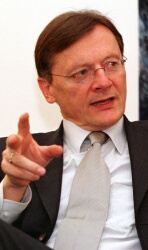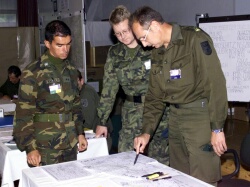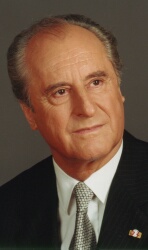Soon after elected, Austria's centre-right coalition government has initiated a debate on the country's declared defence perspective - the implications of which are likely to have far reaching consequences for its planned national security doctrine and defence review.
In January the coalition government ratified a new security doctrine which aims to fundamentally change Austria's defence posture as defined in the 1984 Landesverteidigungsplan.
At the heart of the debate is the drive, led by Minister of Defence Herbert Scheibner and his strategic analysts, to steer Austria's security philosophy away from the Cold War neutral doctrine toward that of 'European security through cooperation' perspective.
 Federal Chancellor Dr. Wolfgang Schuessel
Federal Chancellor Dr. Wolfgang Schuessel
"Classical all-around neutrality must give way to common solidarity within the European family"
Foto: Bundeskanzleramt
|
However, while Chancellor Wolfgang Schuessel has publicly declared "that classical all-around neutrality must give way to common solidarity within the European family" and called for a mutual assistance under EU membership, any change in Austria's traditional status will likely provoke intense criticism from within Socialist and Green Party opposition, and from elements of the national media and Austrian public opinion.
 The Green Party calls NATO an "aggressive and unfriendly alliance", and together with the communists it is actively calling for (or is backing) protests and demonstrations against the first NATO-pfp excercise in Austria.
The Green Party calls NATO an "aggressive and unfriendly alliance", and together with the communists it is actively calling for (or is backing) protests and demonstrations against the first NATO-pfp excercise in Austria.
© Foto/Bundesheer
|
Not only are there two opposition parties arguing that under article 9a of the Austrian Constitution neutrality cannot be revoked, with the Green Party labelling NATO an "aggressive and unfriendly alliance" into which government is covertly attempting to lead the country, but also that mutual-assistance outside as enshrined in article 5 of the 1949 North Atlantic Treaty has no visible support within the EU (non-aligned) member states.
Schuessel has called for a broad national discussion to include all perspectives, noting that a Social-Democrat-lead cabinet signed the Common Foreign and Security Policy, as defined in the May 1999 Amsterdam Treaty amendments to the 1992 Treaty on the European Union.
These amendments, which were later secured in article 23F of the Austrian constitution, define Austria today as a non-aligned country, making the p the concept of 'strict neutrality' outdated.
[Article B of the Common Provisions of the Treaty of European Union, also known as the Amsterdam Treaty, states that one of the objectives of the Union is to: assert its identity on the international scene, in particular through the implementation of a common foreign and security policy, including the eventual framing of a common defence policy, which might in time lead to a common defence.]
Part of the new doctrine calls for the creation of a 'national security-council' led by the chancellor, which will combine the national defence, foreign affairs, and interior ministry councils.
"Although NATO entry is not yet a target", Scheibner argues, "the government agrees that entry into the alliance together with our neighbours was clearly missed in 1999".
Schneiber has called for full security co-operation with NATO, - which he defines as the only working security-instrument in Europe, now and for the foreseeable future.
 President Dr. Thomas Klestil
President Dr. Thomas Klestil
"Especially we Austrians have a special interest in common European structures. The more communality is there for us, the more security."
Foto: Bundeskanzleramt
|
While the current cabinet might not achieve the two-third majority required for the constitutional change necessary for NATO entry, the wheel have been set in motion.
Austria's President Thomas Klestil has called for a review of the armed forces, and following the Amsterdam Treaty, defence officials, pointing to the Swiss model on army reform, have suggested a broad campaign to educate the public of the move away from 'neutrality'.
Key elements of the new Austrian doctrine include:
- The transition away from strict neutrality - this began de facto with Austria's membership of EU, entry to which in January 1995 was signed without any proviso for neutrality.
Austria's international status to be currently defined as 'non-aligned', and any change in that status vis-a-vis integration into an alliance, to be decided autonomously.
- Participation in the whole spectrum of the Petersberg Tasks, Petersburg Declaration of June 1992, which saw the Western European Union (WEU) developing into the EU's defence component.
The Petersburg Tasks in the declaration are listed as:
- humanitarian and rescue tasks
- peace-keeping tasks
- tasks of combat forces in crisis management, including peacemaking
- The acceptance that there is currently no clearly defined military-dominated threat-scenario, although the recognition of the key threat to Austria of destabilisation within Europe. - with particular attention to the geographical proximity to the Balkans.
- The recognition that there can be no reference to Austria's national security without reference to the concept of "European Security".
- The recognition that the predominance of US Forces in NATO will further direct the development of security policy on the European continent and will influence future stability.
Therefore the basis of stability and security in Europe will be the maintenance and enhancement of transatlantic-cooperation.
The government announced, that a conclusion part to this security doctrine policy paper would be published later this year and include a directive upon the issue of a conscript/professional or system for Austria's armed forces, as well as the future structures of the federal army.
However, this second 66-page paper, compiled by General-Troop Inspecteur Gen. Horst Pleiner, became public in June.
Key elements include:
- The recognition that a (theoretical) massive assault by an average-equipped aggressor against Austria could not be prevented or countered by the current Federal Army.
- Austrian air combat capabilities must be described as only 'rudimentary'.
- Austria's Sch23.5 billion ($1.46 billion) defence budget places it at the lowest end of European defence funding, and the historic backlog would require a further Sch150 billion to reach similar Finnish, Swedish or Swiss standards in military equipment.
- Modern equipment questioned by the EU, including 70-90 Pandur armoured personnel carriers, for the 2-3000 Austrian personnel in the proposed European Rapid Reaction Force will require an additional Sch 2/3 billion.
- With current defence funding as it is, the security doctrine's research commission has recommended keeping the general conscription system for at least the next decade.
The commission concluded that for a professional armed forces system with current commitments, Austria would require a startup of 10,900 volunteers with an additional annual defence funding of Sch 53 billion.
  Dr. Heinz Fischer, President of the Austrian Parlament and Senior of the SPOE (left), pointed out that he thinks that it is legally and constitutionally possible to stay neutral without any active air-surveillance...
Dr. Heinz Fischer, President of the Austrian Parlament and Senior of the SPOE (left), pointed out that he thinks that it is legally and constitutionally possible to stay neutral without any active air-surveillance...
The Leader of the SPOE, Dr. Alfred Gusenbauer (right) opts for a decrease of the compulsory military service duration down to 5 months and thinks that interceptor's are dispensable today.
Both are representing the forefront of the pro-neutral powers in Austria.
Fotos: SPOe
|
Early September saw renewed tensions between the cabinet and the coaliton and the Social-Democrats around the future security-orientation.
Despite the wish was expressed agian to see the opposition integrated into a national-reaction towards a changed security-environment, the SPOE and the Greens are enshrined into their position of constitutional-neutrality and are ruling out the word "NATO" in any text.
On the other hand SPOE leader Alfred Gusenbauer last week openly suggested to give away (the neutral core-task of ) air-surveillance to "some international security-cooperation", and acuses the government to sacrifice social-funds for unnecessary aircrafts.
A majority of the population backs this simple argument - despite it still supports neutrality as a common Austrian trademark.
Thus, even funding for previous defence programmes, including the long-overdue RFP for a replacement for the Draken fighter aircrafts, has been delayed (Jane's Defence Weekly 8 August, No. 6) and this is now expected within September.
If funding levels remain unchanged, from 2003 onwards "the Austrian public and the international community will witness" what Gen. Pleiner describes as "massive [detrimental] effects on the combat-ability, quality of training and fulfilment of international duties of the Austrian armed forces".
Or as FPOE Defence Speaker Brig. Jung pointed out, "If there is no minimal consens with the SPOE in the core-question of own air-defence, how should any broad cooperation be thinkable in an overall security-orientation and -integration of Austria ?
It seems as the government would have to take this necessary steps alone !"
The principal obstructions for defence spending along European levels arguably have their roots in the leaving of considerable military equipment to the armed forces (with the exception of aviation materiel) by the Allied occupation forces in 1955 with the consequent emergence of a political culture of 'non-investment' in materiel.
Another 'leftover' is that the majority of the Austrian forces - especially at senior officer level - are employed under an expensive official-service regime, meaning that a significant part of annual defence funding is spent on salaries for permanent cadres.
Scheibner argues that "Efficiency, re- structuring of the bureaucracy and learning are the three guidelines for the reform of the ministerial-structure and the top-command level of the forces, which must go hand-in-hand with the realisation of the new [defence] doctrine".
Under these guidelines, that reform includes:
- Some 200-300 positions (about one fifth) within the central administration will be cut.
The same number is targeted for the senior ranks of the armed forces, meaning less generals and chiefs of sections (a civilian level).
- The detailed personal savings which are now known foresee 892 fixed positions (down from 1414) in 11 instead of 17 Groups and 42 instead of 56 departments.
- The creation of a Chief of General Staff (CGS), who will head all military command tasks and lead the procurement drive.
- The unification of the two army-corps into a Land Forces Command and the "Fliegerdivision" (Army-Aviation) incorporated into an equal Air Forces Command.
- The reduction of departments in the Ministry of Defence (MoD) from five to three and the introduction of a new Controling department, which will present a periodical review army's combat readiness.
- The ratio of military to civilian officials at higher levels of the MoD to be reversed from 30:70 to 60:40; and the merging of the MoD's Procurement Department with the Department of Defence Technology.
According Scheibner, all these changes and modifications are scheduled to be released by 1 April 2002, but "all Austrian armed forces' international commitments (following the withdrawal from UN Force in Cyprus (UNFICYP) in 2000) will remain unchanged."
 Federal Chancellor Dr. Wolfgang Schuessel
Federal Chancellor Dr. Wolfgang Schuessel The Green Party calls NATO an "aggressive and unfriendly alliance", and together with the communists it is actively calling for (or is backing) protests and demonstrations against the first NATO-pfp excercise in Austria.
The Green Party calls NATO an "aggressive and unfriendly alliance", and together with the communists it is actively calling for (or is backing) protests and demonstrations against the first NATO-pfp excercise in Austria.
 President Dr. Thomas Klestil
President Dr. Thomas Klestil

 Dr. Heinz Fischer, President of the Austrian Parlament and Senior of the SPOE (left), pointed out that he thinks that it is legally and constitutionally possible to stay neutral without any active air-surveillance...
Dr. Heinz Fischer, President of the Austrian Parlament and Senior of the SPOE (left), pointed out that he thinks that it is legally and constitutionally possible to stay neutral without any active air-surveillance...